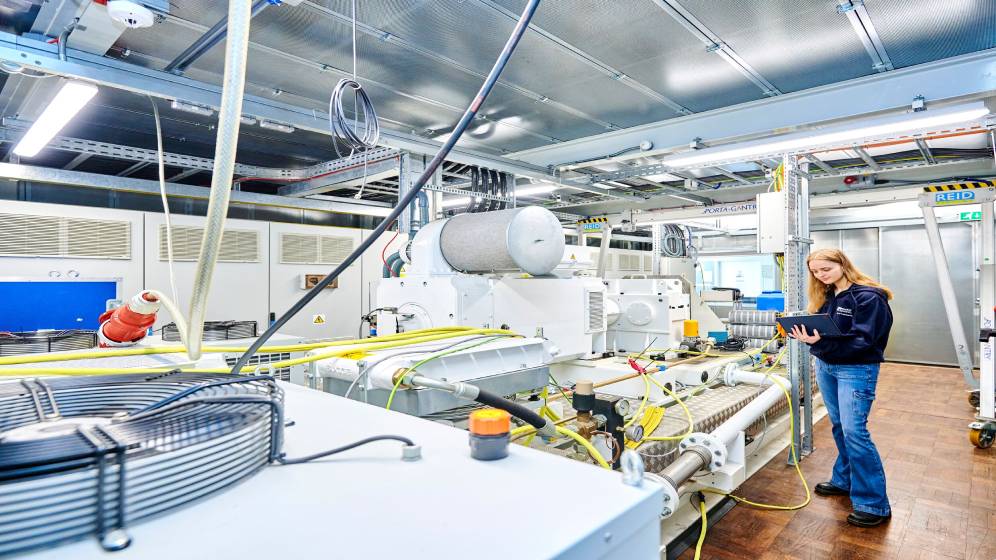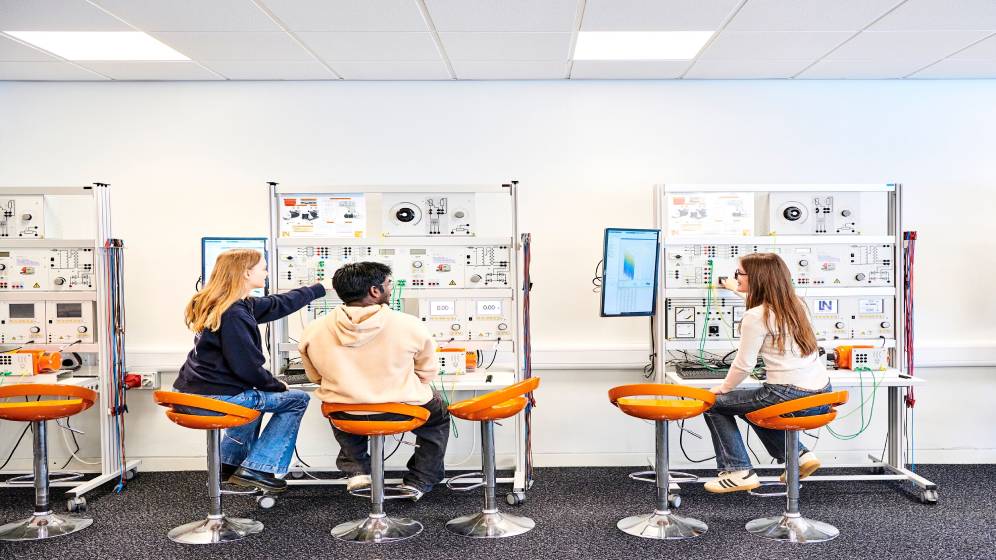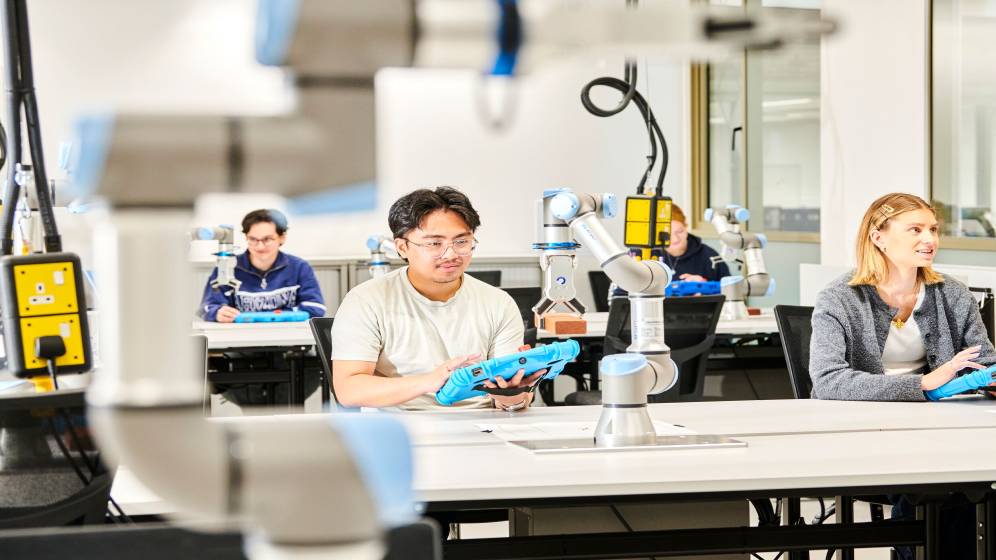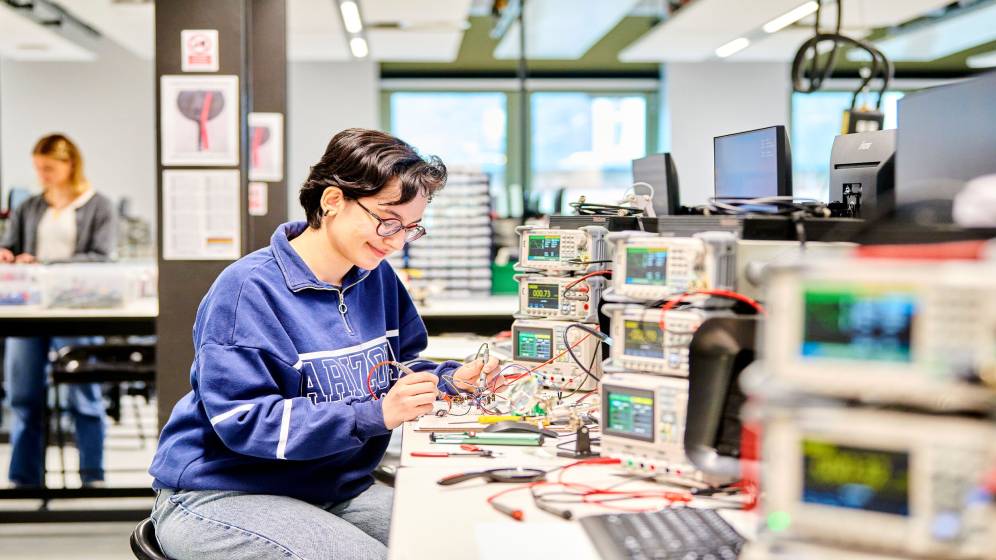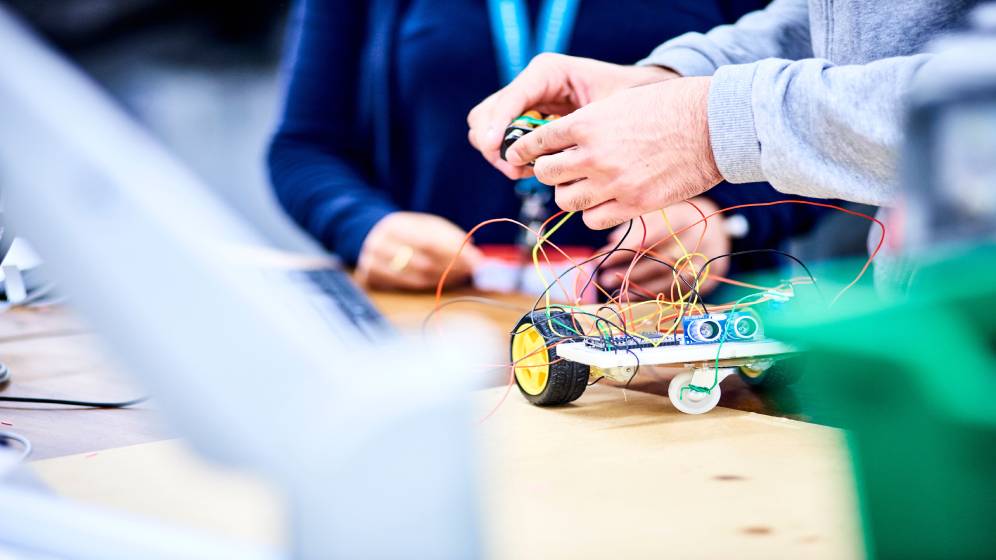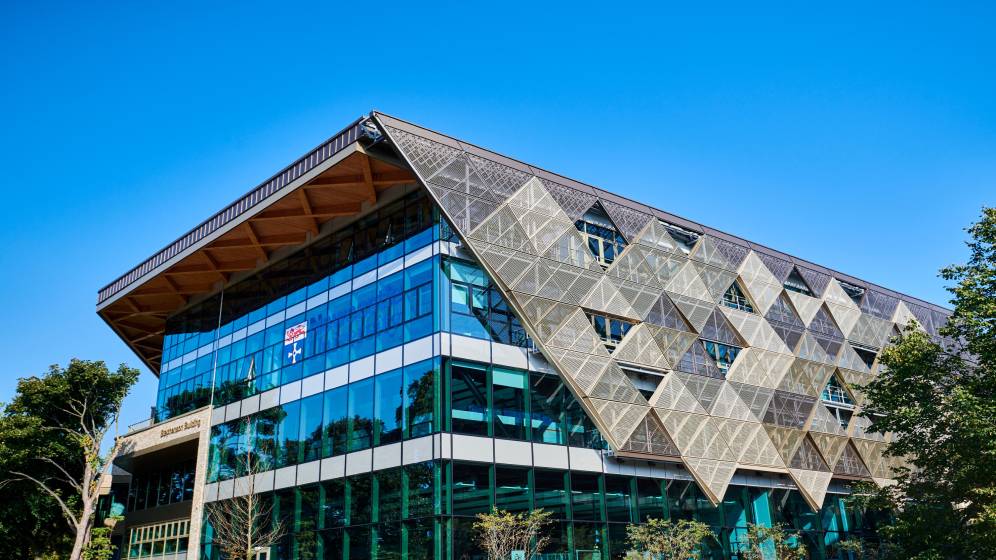Electrical and Electronic Engineering with Industrial Project MEng Honours
- UCAS code: H605
- Full time
- 4 years
This comprehensive four-year MEng degree combines master's-level study and an industrial placement.
You are currently viewing course information for entry year: 2026
Next start date:
- September 2026
UCAS Institution name and code:
- NEWC / N21
Course overview
Our professionally accredited integrated Master's degree focuses on developing your core knowledge and practical skills. Covering a wide range of cutting-edge electrical and electronic engineering topics, you will be fully prepared for a career in this fast-paced industry.
With a focus on practical work and research-informed teaching, you'll cover the key aspects of electrical and electronic engineering. You'll then choose to specialise in one of our research excellence areas:
- electrical power
- sensors and communications
- microsystems engineering
You'll also work on a real-world engineering project with an industry partner. This will help you:
- gain an insight into the sector
- develop industry contacts
- enhance your CV
The course will help you establish a firm foundation of electrical and electronic engineering knowledge. You'll also become an expert in more specialist topics through optional modules such as nano-electronic devices and national-scale electricity networks.
BEng or MEng?
Both our BEng degree and specialist MEng degrees provide a pathway to becoming a Chartered Engineer. This is one of the most recognisable international engineering qualifications.
Our MEng degrees are a direct route to becoming a Chartered Engineer (CEng). You don’t need to study any more qualifications after your degree to work towards chartered status.
Our three-year BEng degree can also lead to Chartered Engineer status. However, you’ll need to complete further study, such as an approved master’s degree.
READ MORE
Your course and study experience - disclaimers and terms and conditions
Please rest assured we make all reasonable efforts to provide you with the programmes, services and facilities described. However, it may be necessary to make changes due to significant disruption, for example in response to Covid-19.
View our Academic experience page, which gives information about your Newcastle University study experience for the academic year 2025-26.
See our terms and conditions and student complaints information, which gives details of circumstances that may lead to changes to programmes, modules or University services.
Additional information
This degree allows you to explore several engineering disciplines in year one. This flexible route is taught across Civil, Electrical & Electronic and Mechanical Engineering.
You'll gain an understanding of engineering in a multidisciplinary context. You'll develop diverse skills relevant to the needs of industry and today’s global challenges.
After successfully completing Stage 1, you'll have the option of transferring on to one of the accredited Civil, Electrical & Electronic or Mechanical Engineering degrees. This is subject to the degree programme regulations and capacity of the degree you are transferring to.
Quality and ranking
Professional accreditation and recognition
All professional accreditations are reviewed regularly by their professional body.
Modules and learning
Modules
The information below is intended to provide an example of what you will study.
Most degrees are divided into stages. Each stage lasts for one academic year, and you'll complete modules totalling 120 credits by the end of each stage.
Our teaching is informed by research. Course content may change periodically to reflect developments in the discipline, the requirements of external bodies and partners, and student feedback.
Optional module availability
Student demand for optional modules may affect availability.
Full details of the modules on offer will be published through the Programme Regulations and Specifications ahead of each academic year. This usually happens in May.
To find out more please see our terms and conditions
Stage 1 will provide a broad introduction to the principles of engineering. You will gain an understanding of design processes in a multi-disciplinary context. This will aid the development for your professional skills. You will also focus on engineering materials, mechanics, and electrical and electronic engineering.
Modules
During Stage 2, you'll build upon your knowledge and skills, covering subjects including computer systems and microprocessors, digital electronics, semiconductor devices and analogue electronics, and more.
Modules
You'll continue to explore a wide range of topics, including areas such as electrical machines, digital signal processing, power system operation, and electronic devices. You'll also complete an individual project and dissertation, as well as a study project focusing on a new technical area.
In Stage 3 you will select a specialism and study topics focused on either electrical power, intelligence sensing and communications or microsystems. Specialising gives you unique employability in your chosen focus area.
Stage 3 also includes a dissertation project. This incorporates professional skills such as project management, and law specifically tailored for for electrical engineers. Leading research and current engineering trends will inform your project topic. Your project is supervised by academics who are experts in their research field.
Modules
| Compulsory Modules | Credits |
|---|---|
| Industrial Automation and Control Systems | 20 |
| Individual Project and Technical Report | 30 |
| Business and Law for Engineers | 10 |
In Stage 4, you’ll select modules aligned with our three research groups’ expertise. At this advanced level, you’ll study specialised Master's-level modules focused on contemporary industrial topics.
You'll work on a group design project, an industrial project, and complete a piece of extended coursework, where you'll design and operate a real engineering device or system.
Recent industrial projects have included protocols for electronic drive control, an electric bike, and connections for low carbon technology to the power grid, for companies such as Tridonic, Dyson, and Imagination Technologies.
Modules
| Compulsory Modules | Credits |
|---|---|
| Engineering Study project | 10 |
| Group Design Project | 30 |
| Industrial Project | 40 |
Some of these optional modules are only available to those that have completed certain pre-requisite modules at Stage 3.
We base these figures and graphs on the most up-to-date information available to us. They are based on the modules chosen by our students in 2024-25.
Teaching time is made up of:
- scheduled learning and teaching activities. These are timetabled activities with a member of staff present.
- structured guided learning. These are activities developed by staff to support engagement with module learning. Students or groups of students undertake these activities without direct staff participation or supervision
Teaching and assessment
Teaching methods
You'll be taught through a combination of:
- lectures
- lab sessions
- tutorials
- real-world case studies
Assessment methods
You'll be assessed through a combination of:
-
Assessments
-
Assignments – written or fieldwork
-
Case studies
-
Coursework
-
Dissertation or research project
-
Examinations – practical or online
-
Group work
-
Practical sessions
-
Presentations
-
Projects
-
Reports
-
Seminar tasks/exercises
Skills and experience
Research skills
Our teaching is informed by our ground-breaking research. Our academic staff are experts in their field, with a diverse range of research strengths. See our research section for more information.
In Stage 3 you'll complete an individual research project, resulting in the design and development of an original system or device.
Business skills
In Stage 2, you'll work on a group design and construction project, gaining hands-on experience in planning and managing technical projects.
You'll complete a module in accounting, finance, and law for engineering, equipping you with the business and legal knowledge crucial for success in the industry.
You'll also have the option to undertake a work placement between Stages 2 and 3, allowing you to develop your professional expertise.
Practical skills
This is a practical-focused course and you'll have access to our state-of-the-art teaching laboratories, including labs for electronics, electrical power, smart grids, and our Intelligent Sensing Lab. You'll also benefit from a machines laboratory, class 100 clean rooms, and a massive MIMO for 5G research.
Opportunities
Work placement
Get career ready with a work placement and leave as a confident professional in your field. You can apply to spend 9 to 12 months working in any organisation in the world, and receive University support from our dedicated team to secure your dream placement. Work placements take place between stages 3 and 4.
You'll gain first-hand experience of working in the sector, putting your learning into practice and developing your professional expertise.
If you choose to take a work placement, it will extend your degree by a year. Placements are subject to availability.
Facilities and environment
Facilities
Our Electrical and Electronic Engineering courses are taught at our city-centre campus, within the School of Engineering based in Merz Court and the Stephenson Building.
You'll benefit from world-class facilities and living labs, ranging from microbiology laboratories through to at-scale engineering equipment.
Electrical and Electronic Engineering has its own specialist facilities, including:
- the Millennium Laboratory – home to a wide range of facilities and experimental rigs
- Merz Court Pilot Plant Laboratory – a pilot plant with 28 experimental rigs
- BE:WISE – Europe's largest wastewater treatment research facility
- the Urban Observatory – with sensors gathering over 50 types of data across the city
- Electronics Teaching Lab – home to state-of-the-art Agilent/Keysight digital test equipment
- Clean-Room Microfabrication Lab – home to two class 100-10000 clean rooms
Support
To support you in your studies, all new students entering year 1 or year 2 will receive a start-up pack containing essential personal protective equipment.
You'll receive comprehensive support from the moment you arrive at the University. You'll be supported by personal tutors, stage tutors, and degree tutors. You'll also benefit from the School's student buddies scheme.
Your future
Electrical and Electronic Engineering graduates enjoy strong career prospects, as their skills are widely applicable in a technologically advancing world.
When you graduate you'll have opportunities in areas such as:
- electrical supply and distribution
- power systems
- transports
- electrical machinery
Our increasing reliance on technology, from renewable energy and smart grids to telecommunications and robotics, drives continuous demand for engineers. Emerging fields like artificial intelligence, the Internet of Things (IoT), and electric vehicles further expand your job opportunities.
Recent graduates have secured roles as graduate engineers in companies including:
- Dyson
- Siemens
- Arup
- IQHQ
- BBC
- BT
You'll also develop a wide range of transferable skills, including analytical skills, teamwork, time management, and IT skills, which are valued by employers across all sectors.
Industry links
You'll work on real-world engineering projects set by companies we have links with, allowing you to apply your skills to real challenges faced by potential employers.
You'll also have access to guest lectures from alumni and leading companies, site visits, and placements.
Our graduates go on to work in a wide range of roles, industries, and sectors. Recent graduates have secured positions in:
- ABB
- Centrica
- Satorius
- BP
- Nissan
- BAE Systems
- Ministry of Defence
- Caterpillar
- ABS Group
- Anek Lines
- Royal Navy
Engineering is a broad field with a number of different specialisms. Whichever engineering discipline you study, you'll emerge as an in-demand graduate with great career prospects.
From global careers in the oil, gas and energy, pharmaceutical, or consumer products sectors, through to marine engineering and offshore engineering. There are also opportunities in groundbreaking research and consultancy, as well as business and management.
Many of our students also progress on to further study, either within engineering or in a related field.
Careers support
Our Careers Service is one of the largest and best in the country, and we have strong links with employers. We provide an extensive range of opportunities to all students through our ncl+ initiative.
Visit our Careers Service website
Recognition of professional qualifications outside of the UK
If you’re studying an accredited degree and thinking about working in Europe after you graduate, the best place to find current information is the UK Government’s guidance on recognition of UK professional qualifications in EU member states. This official resource explains whether your profession is regulated in another country, what steps you need to take, and which organisation you should contact.
Entry requirements
All candidates are considered on an individual basis and we accept a broad range of qualifications.
The entrance requirements and offers below apply to 2026 entry.
| A-Level | |
|---|---|
| International Baccalaureate | |
|---|---|
Other UK and the Republic of Ireland qualifications
Alternative offers at Newcastle
Through one of our contextual or alternative offer routes, you could receive an offer of up to three grades lower than the typical requirements.
Contextual offers
We use certain contextual data from your UCAS form, alongside your application, to consider challenges that you may have faced in your education and the potential effect this may have had on your qualifications. This means you may be eligible to receive a lower contextual offer.
PARTNERS offers
One of the largest and longest support entry routes to university of its kind for students from underrepresented backgrounds. We support applicants from application through to study.
Realising Opportunities offers
A unique programme delivered in collaboration with 10 leading, research-intensive universities in the UK. The programme is open to students in Year 12/first year of college.
Pathways to Newcastle offers
Pathways to Newcastle, our national skills entry route, is available for specific subject areas.
High Performance Athletes
We support promising athletes at the application stage, who compete in regional, national or international levels in their sport.
Qualifications from outside the UK
English Language requirements
Entrance courses (INTO)
International Pathway courses are specialist programmes designed for international students who want to study in the UK. We provide a range of study options for international students in partnership with INTO.
These courses are specifically designed for international students who want to study in the UK and progress onto one of our undergraduate degrees. Our International Study Centre, has a range of study options including:
- International Foundation
- International Year One
- English Language courses
Find out more about International Pathway courses
Admissions policy
This policy applies to all undergraduate and postgraduate admissions at Newcastle University. It is intended to provide information about our admissions policies and procedures to applicants and potential applicants, to their advisors and family members, and to staff of the University.
University Admissions Policy and related policies and procedures
Credit transfer and Recognition of Prior Learning
Recognition of Prior Learning (RPL) can allow you to convert existing relevant university-level knowledge, skills and experience into credits towards a qualification. Find out more about the RPL policy which may apply to this course.
Additional information
Advice on maths and science requirements
If you don’t think you will have the exact mathematics and science qualifications referred to in our entry requirements by the time you need them, you may not be sure what to do.
- If you have a maths qualification but will not have it at A Level (or equivalent) when you start your degree, you should apply for the relevant degree with Foundation Year. We may give you the opportunity to take the Newcastle University Pre-Entry Maths Course* and the option to start in Year 1 if we think that this will be the best route for you.
- If you have A Level Maths (or equivalent) already but not at the required grade, you should contact us for advice. We may decide that you could be considered for Foundation Year entry, or it may be that this course is not the best option for you.
- If you will not have the equivalent of an A Level in the science subject (if any) required, you should apply for the relevant degree with Foundation Year.
If you are still not sure, don’t worry. Whatever you apply for, our Admissions Tutors will help you decide which is the best route for you. They may, therefore, make you an offer for a different course from the one you apply for (eg Foundation Year entry instead of Year 1 entry).
*The Newcastle University Pre-Entry Maths Course aims to provide the requisite mathematical skills and concepts needed on our engineering, maths and physics degree courses and to prepare students for the modes of learning they will encounter. The materials for the course are delivered electronically and include opportunities to practise your skills. You study the materials in your own time and, when you are ready, you book your exam with the Engineering School to which you have applied. A fee of £150 is payable at the time of booking the exam or shortly before the date set for examination.
Tuition fees and scholarships
Tuition fees for academic year 2026-2027
The 2026 entry home fees have not yet been confirmed.
| Qualification: MEng Honours | |
|---|---|
|
Home students full time 4 years |
Tuition fees (Year 1)
Not set |
|
International students full time 4 years |
Tuition fees (Year 1)
30,700 |
Year abroad and additional costs
For programmes where you can spend a year on a work placement or studying abroad, you will receive a significant fee reduction for that year.
Some of our degrees involve additional costs which are not covered by your tuition fees.
Scholarships
Find out more about:
Open days and events
You'll have a number of opportunities to meet us throughout the year at our on-campus and virtual open days.
You'll be able to:
- explore our beautiful campus
- find out about our vibrant city
- discover what students think about studying at Newcastle
You'll also have the opportunity to speak to academic staff and find out more about the subjects you're interested in.
Find out about how you can visit Newcastle in person and virtually.
We regularly travel overseas to meet with students interested in studying at Newcastle University. Visit our events calendar to find out when we're visiting your region.
How to apply
Apply through UCAS
To apply for undergraduate study at Newcastle University, you must use the online application system managed by the Universities and Colleges Admissions Service (UCAS). All UK schools and colleges, and a small number of EU and international establishments, are registered with UCAS. You will need:
- the UCAS name and institution codes for Newcastle University (NEWC/N21)
- the UCAS code for the course you want to apply for
- the UCAS 'buzzword' for your school or college
If you are applying independently, or are applying from a school or college which is not registered to manage applications, you will still use the Apply system. You will not need a buzzword.
Apply through UCASApply through an agent
International students often apply to us through an agent. Have a look at our recommended agents and get in touch with them.
Get in touch
By phone
Call us on +44 (0) 191 208 3333 and press option 1. Our opening hours are Monday to Friday 10am until 4pm.
Live chat
Our NCL chatbot might be able to give you an answer straight away. If not, it’ll direct you to someone who can help.
You'll find our NCL chatbot in the bottom right of this page.
Online
Chat to our students
Choosing a university is a big decision. If you've got questions about a particular course, student life or the city of Newcastle, why not chat to our friendly students or graduates!
Keep updated
We regularly send email updates and extra information about the University.
Receive regular updates by email








